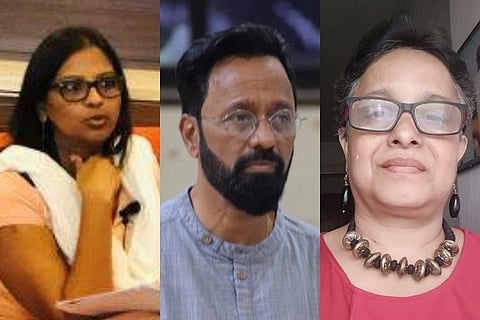

On the night 26-year-old Disha (not her real name) was raped and murdered in Hyderabad, the cops at Shamshabad had a rather problematic question before filing a missing complaint lodged by her parents. They cast doubts whether Disha had eloped with someone and that if she had, there wasn’t any need to file a case. Though insensitivity on the part of the cops may not come as a surprise, their doubts on "what-the-woman-was-doing" cost her life.
“Police do not ask questions when a family files a missing complaint of a man. But when it comes to a woman, cops are entitled to ask myriad questions… the degree of rape and murder is reduced if a woman was at a pub or was out with her partner at night. Our society has always wanted ‘pure victims’ to sympathise with — a murder or rape is termed brutal only if a woman was out doing things that confirms with the norms society has set for a woman,” said Hyderabad-based advocate Ravichander, who was speaking at a panel discussing rape culture in India on Monday.
The discussion organised by organised by SAMVAD advocacy’s Poorn Viraam, Good Universe and Mobbera Foundation under the aegis of Nirbhaya Jyoti Trust, had other eminent personalities who highlighted how rape is normalised in everyday lives in India and the need to address rape as a cultural issue.
The panel included Dr Anita Rego, a public health professional and an advocate of human rights, Sandipan Kushary, an LGBTQIA+ activist and president of Moberra Foundation, advocate L Ravichander, a High Court lawyer and ardent supporter of safety for women and Sowjanya Tamalapakula, a professor of gender studies at the English and Foreign Language University (EFLU) in Hyderabad.
The panellists pointed out that rape is not sex, but the violation of a person’s personal space through means of power and control. Advocate Ravichander noted how this power comes into play because different standards are set for men and women in society.
The discussion also focussed on selective outrage and how our mechanisms to prevent rape are devoid of inclusivity. Talking to the audience, Sowjanya pointed out how the Nirbhaya and Disha cases are not isolated and must be viewed in a larger scenario.
People from middle class and upper middle class find it convenient to outrage when victims match their class and creed, especially when the accused belongs to lower strata of the society, she said.
“Our society does not practice inclusivity when it comes to preventing rape. For example, people have been advocating women to practice martial arts as a defence mechanism against violence. What about a woman in a wheelchair who cannot do the same? Neither can martial arts help when 4-5 men gang up against a woman nor there is a one-stop solution to rape. Shooting down the accused also wouldn’t stop rapes. It’s the culture of rape we need to address and find solutions to,” Sowjanya said.
Further, LGBTQIA+ activist Sandipan Kushary, better known as Sandy, pointed out that issues of sexual violence against transgender persons and gay men are rarely addressed.
“There are men, especially young boys who get raped. But they do not come forward due to fear of being ridiculed. Cops question gay people when they report on how men could be raped. It is worse for transgender persons. They are seen are sex workers and hence it is assumed that that do not have the right to report violation of consent,” Sandy said.
Sandy added that even MNCs in Hyderabad claim to be LGBTQIA+ allies on paper, but fail to take action on complaints of discrimination.
“We hardly have 4-5 transgender people working in the 100 odd MNCs in Hyderabad today. Recently, one of them had to quit because of lack of transgender-friendly washrooms,” added Sandy.
Ravichander also criticised the draft law by the Andhra Pradesh government which seeks to conclude legal proceedings in rape cases within 21 days, and give death penalty to convicts in cases of heinous crimes. He noted how it would force cops to hurriedly put together scratchy evidence and finish the case before the court in just two weeks.
“The AP law is an indication of how the government looks at the issue of rape in our society. Rape is a cultural problem, not just a law and order one. It’s also a failure of our judiciary. Most of our judges are socially insensitive,” Ravichander said, adding that many judges have not kept up with the times. “Rapes cannot be prevented by asking your boys to look at a woman as his mother or sister. Rather we need to weed it out from its roots, which should begin from kindergarten textbooks.”
"It is time that we all start self introspection and see what are the actions we are doing to propagate rape culture. If you are a citizen with a will to fight rape culture- the one change you can make is to yourself,"Ekta Viiveck Verma, Founder Poorn Viraam, concluded.